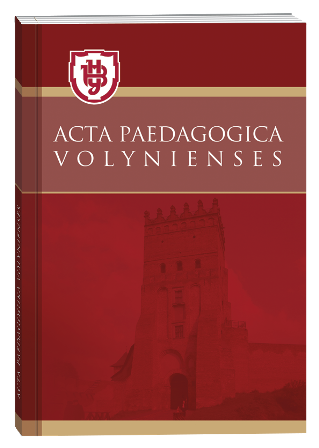ORGANIZATION OF STUDENT’S INDEPENDENT WORK IN INSTITUTIONS OF HIGHER EDUCATION
DOI:
https://doi.org/10.32782/apv/2021.4.19Keywords:
organizational forms of education, types of independent educational work, conditions for self-study in institutions of higher educationAbstract
The article describes the content of students’ independent work in institutions of higher education and focuses on its main types; it covers the forms of organization of independent studies. It is noted that its effectiveness and efficiency depends on the active stance of the teacher and the students themselves. It is emphasized that involvement in independent studies has a positive effect on the level of formation of independence and creativity of the future professional. It was found that independent work is a type of studies in a higher education institution performed in both in classroom and at home, aimed at acquisition of professional knowledge, skills and abilities by the students and forming their independence. Its types are characterized, depending on the nature of leadership, the level of commitment or level of initiative, active stance and creativity of the university student in the educational process. It is noted that indicators of an individual’s independence during training are the ability to independently acquire knowledge and gain experience and use them for self-education and in practice. Emphasis is placed on the fact that the success of independent work depends on the gradual involvement in it: teacher’s presentation of his subject (presenting the material, explanation of methods of its processing, etc.); students’ participation in the acquisition and transformation of information; teacher’s control and self-control. Thereby, the student’s educational activity goes through the stages of preparation, training and creative research. The conditions of effective organization of students’ independent work in higher education institutions have been singled out, including a convenient educational environment of the university (regularity, consistency, phasing, continuity of education); proper guidance by the teacher, expediency of specific methods of educational work; a proper balance of student independent work both in class and at home, a rational use of time, motivation for self-education, etc.
References
Біленька І., Лазаренко Н. Організація самостійної роботи студента у закладах вищої освіти. Збірник матеріалів Всеукраїнської науково-методичної конференції «Забезпечення якості вищої освіти» 08–10 квітня 2020 р., Одеса, 2020. С. 526–528. URL: http://mv.onaft.edu.ua/download/konfer/82647.pdf
Вишневський О. Теоретичні основи сучасної української педагогіки : посібник. Дрогобич : Коло, 2006. 608 с.
Котова А. Визначення сутності та змісту самостійної роботи студентів у вищих навчальних закладах. URL: https://www.sportpedagogy.org.ua/html/journal/2008-03/08kavhei.pdf
Кузьмінський А. Педагогіка вищої школи. Київ : Знання, 2005. 486 c.
Лаврентьєва О. Особливості організації самостійної роботи майбутніх учителів природничих дисциплін. Теорія і практика організації самостійної роботи студентів вищих навчальних закладів : монографія. кол. авторів / ред. проф. О.А. Коновала. Кривий Ріг : Книжкове видавництво Киреєвського, 2012. С. 66–93.
Литвин В. Українська культура й освіта в контексті суспільних трансформацій. Урядовий кур’єр. 2002. 24 вересня. № 175. С. 87–94.
Мачинська Н., Стельмах С. Сучасні форми організації навчального процесу у вищій школі. Львів : Львівський державний університет внутрішніх справ, 2012. 180 с.
Нагрибельна І. Самостійна робота в системі підготовки майбутніх учителів до навчання української мови в початкових класах : дис. … д-ра пед. наук : 13.00.02. Херсон, 2016. 483 с.
Організація самостійної роботи студентів / за заг. ред. В.М. Король, В.П. Мусієнко, Н.Т. Токової. Черкаси : Вид-во ЧДУ, 2003. 216 c.
Gratton, R. Collaboration in students’ learning: the student experience. Support for Learning. 2019. № 34. P. 254–276. doi: https://doi.org/10.1111/1467-9604.12261
Hockings, C. Reaching the students that student-centred learning cannot reach. British Educational Research Journal. 2009. № 35. P. 83–98. doi: https://doi.org/10.1080/01411920802041640
Zhoc, K., Chung, T., & King, R. (2018). Emotional intelligence (EI) and self-directed learning: Examining their relation and contribution to better student learning outcomes in higher education. British Educational Research Journal. 2018. № 44. P. 982–1004. doi: https://doi.org/10.1002/berj.3472







